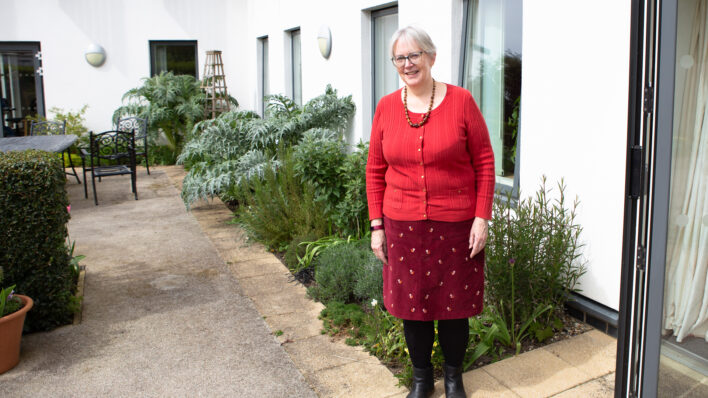Local Celebrant shares the importance of funeral wishes with Hospice patients
Share this story

Olivia Burren has been a Celebrant for over 10 years, and kindly visited the Living Well Service, at Arthur Rank Hospice Charity, to give a presentation about her work to patients.
Olivia explained that she visits families of loved ones, who have died, to write, or help them write, the eulogy at a funeral, service or gathering. She starts by asking them questions about their loved one’s life; such as where they grew up, went to school etc. but also likes to hear all about the person – what they liked and disliked. She said:
“It doesn’t have to be about a Nobel peace prize – I love it when someone shares anecdotes about the neighbour’s cat or something similar. People often laugh at the stories.”
Olivia said it is helpful to the families if the person [who has died] has left instructions for their wishes after their death. She shared a ‘Funeral Plan’ where people can complete different sections of their choice, for the funeral service, which include:
- Music to be played– specify the artist as well as the track and why you/they chose it
- Poetry or readings
- Some things about me/them: family, early life, school, job, hobbies, interests.
- Who has been important in your/their life
- Things you/they love(d)
- Things you/their dislike(d)
- A favourite place and time
- My/their proudest achievement
- The legacy I/they hope I/they have passed on
- I’d like you to remember me as ….
- My/their hope for the future after I’ve/they’ve gone
- Anything else e.g. People to wear a specific colour or dress code, I’d like a motorbike hearse, dove release etc.

This was also a time to share the Charity’s ‘Ducks in a row’ booklet, which was produced by the Hospice, to guide people through the process of recording their affairs, allowing them to collect information about their life in one place. ‘Your final wishes’ section on pages 28-30, include very specific instructions for loved ones after the person has died. Olivia also mentioned The Good Funeral Guide for a place to get information.
She talked about the importance, to the grieving family, to be able to celebrate the lives of their loved ones, with the confidence of knowing they would have approved. She added:
“Even if someone knows they are dying, it can still be a shock for the family. Having clear instructions about their wishes can be very beneficial at a time when they are grieving.”
She shared the top ten funeral songs, which include some of the classics, such as ‘My Way’ by Frank Sinatra and ‘Over the Rainbow’, but also some lighter ones such as Monty Python’s ‘Always look on the bright side’.
Olivia said:
“It is important for the family, or loved one, to choose what is right for them – and that can be different for everyone. Some people want a religious service, and others want a direct cremation. Memorial services can be held anywhere; a village hall, someone’s home or even in the pub.”
She also discussed children at funerals and whether they want to attend a service or not and added:
“It is better to be open and honest with children and use clear and age appropriate language. The children often like to be included and they usually smile when they hear their name read out at the service.”
I asked Olivia how she started as a Celebrant and her answer was not what I was expecting:
“I tripped over a hairdryer! I hurt my knee and whilst I was recovering, I realised I wanted a job with a purpose and this one popped up. I love it, it is a privilege. I also teach trainee Celebrants now too. “
One patient who attended the session returned the following week and shared:
“After the session I put a folder together with all my details, such as insurance etc. but also my funeral wishes, and I chose a song: ‘Who wants to live forever’ by Queen as I’ve always been a Freddie Mercury fan. I try not to think about it all now.”
Bereavement support can be found on our website here: https://www.arhc.org.uk/supporting-you/care-services/patient-family-support/bereavement/
and here: https://www.arhc.org.uk/supporting-you/care-services/patient-family-support/bereavement/bereavement-support-resources/which includes an online Grief Chat service.
View other stories
-

Hospice supporter climbs Snowdon in memory of her Uncle Piers
Molly is inspired to fundraise in memory of her Uncle Piers
-

Living Well Patients at the Hospice relax with Meditation
David Lynch from The Mindful Green Coach, visits the Living Well Service
-

Cambridge Hospice Volunteer supports with pre-loved fashion at Wimbledon Tennis Tournaments in London
Volunteer, Nadia Macari-Brown supports the Charity at one of the most famous sporting events in the world
-

Russell shares his Living Well experience
"There’s a very, very good and tight family atmosphere here"




